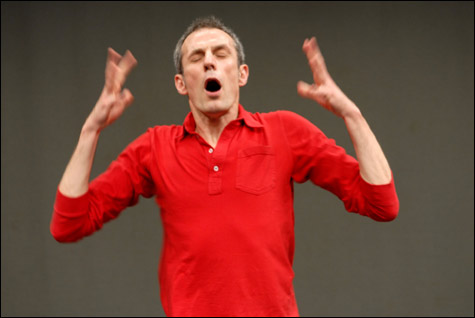
SELF-UNFINISHED: What’s limiting about this solo is that for every optical illusion Le Roy serves up, he brushes off its narrative implications. |
Surrealists who work with movement have to manage a demanding slight-of-hand. The human body is invariably individual, and usually equipped with a standard set of limbs. Its shape and capacities are familiar and evocative. Subverting those presumptions calls for an audience willing to enroll in some perceptual heavy lifting.
When French artist Xavier Le Roy, who’s based in Montpellier, performed his Self-Unfinished solo during the 2007 Boston Cyberarts Festival, his Everyman surrealism seemed unadorned and approachable. Last weekend in the ICA’s Barbara Lee Theater, the same piece made claims to grander, minimalist seriousness. Le Roy may have come to his manner of working from a background as a biochemistry student, but his genre has been established by troupes including Mummenschanz in Europe, some strains of butoh in Japan, and Pilobolus and Momix here in the States.
Self-Unfinished is a sequence of self-transformations. Le Roy’s body language, as he sits at a table appraising the audience, is casually coiled. He turns himself into a robot, whirring and piffing in the audible syntax of a disappearing industrial age. Then he pulls his shirt over his head. Erasing the distinctions between his hands and his feet against the floor, he becomes a push-me/pull-you slinky. Naked, he balances on his shoulders, so that his turned back appears to be a headless torso and his bent arms splay like amphibian legs — he’s a Frog Prince who, once upon a time, was a human being.
What’s ultimately limiting in this solo is that for every optical illusion he serves up, he brushes off its narrative implications. “Think this shape means something?” the choreography seems to say. “That’s your brain at work, sister, not me.”
There’s a different and sloppier game being played in Le Sacre du Printemps. The concept is rich: Le Roy “learns” a conductor’s gestural vocabulary and then “conducts” a performance of Stravinsky’s Sacre as played by the Berlin Philharmonic. The notes I jotted during the performance remarked that he looked “elfin, lively, serious, like Simon Rattle with a haircut.” When I checked Le Roy’s Web site the next morning, it turned out that Rattle was indeed his model. Unfortunately, Le Roy resembled Rattle less than he did comedian Danny Kaye conducting a charity concert with a flyswatter.
Sound designer Peter Bohm had done a heroic job outfitting the ICA theater with more than 50 speakers placed under the seats and around the auditorium, so that audience members could settle among the implied timpani or violins. Le Roy, however, only occasionally cued instruments from among the audience’s ranks. Instead, he grimaced and fidgeted, top-rocked and hopped as if ready to dunk a basketball. He “brought in” different instruments late for their (recorded) entrances. He put his finger to his lips for a diminuendo when everything was at the same dynamic, counted beats in plain neglect of Stravinsky’s careering time signatures, and walked off stage while the music continued.
This Sacre was all very conceptual, and it certainly gave the performer a workout. But it never developed beyond the joke of conductor karaoke. The opportunity that Le Roy missed was the rite of showing us how a great conductor summons a score — and how he makes great listening visible.
XAVIER LE ROY’S MORE FLOOR PIECES, created with members of the MIT community, will be presented in a free performance at MIT’s Media Lab on April 24 [617.253.4415 orhttp://cavs.mit.edu].